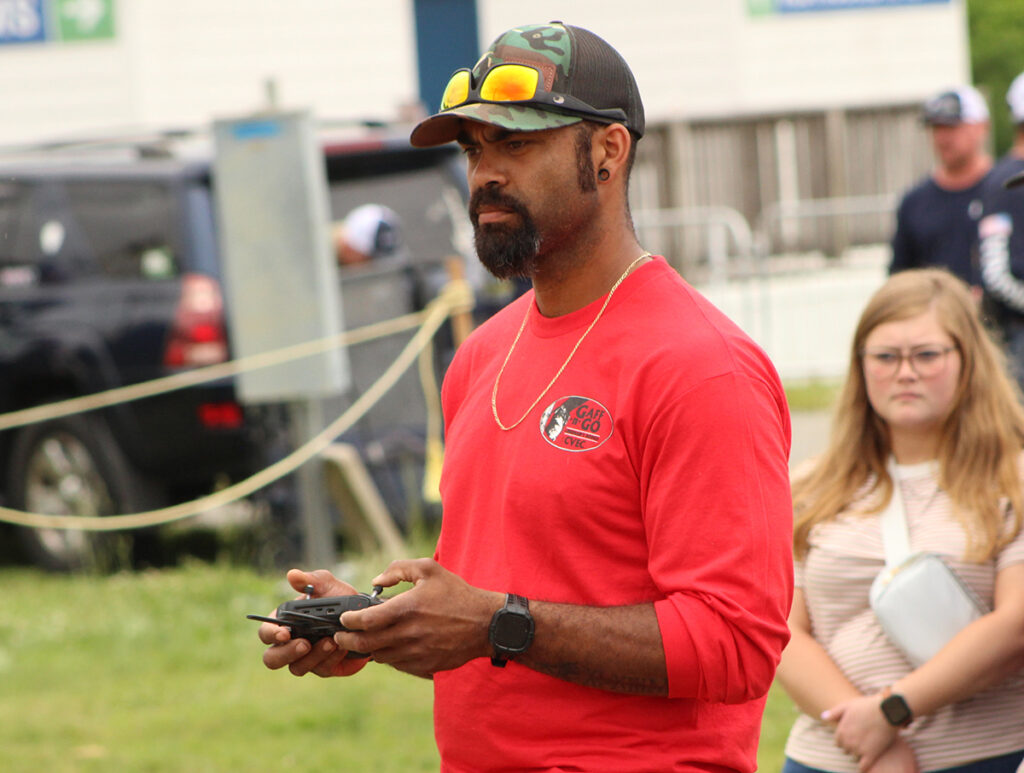
DOSWELL, Va.—Brandon White has operated a drone hundreds of times. But not quite like this.
A journeyman lineworker at Central Virginia Electric Cooperative, White confessed to a slight case of the jitters when he was first up in the inaugural drone operators competition May 17 at the annual Gaff-n-Go Rodeo.
“It was a little nerve-wracking. It was definitely an adrenalin rush,” said White, who has piloted drones over transmission lines but never as part of a judged event. “The drone didn’t hit the ground; that’s the main thing.”
Actually, White did more than steer Arrington, Virginia-based CVEC’s device away from trouble.
He took first place in the event, which required competitors to navigate a course and snap quality images of logos tucked inside of five buckets affixed at angles to 40-foot-high poles. They also got points based on factors such as pinpoint landings.
The fact that drones are at the point where they merit such an event shows how the technology is advancing, said Steve Harmon, a former lineworker who is president and CEO of Community Electric Cooperative in Windsor, Virginia.
Harmon also chairs the rodeo committee of the Virginia, Maryland & Delaware Association of Electric Cooperatives, which organized the rodeo, held at Meadow Event Park north of Richmond.
“I could not have conceived of this when I was a lineman,” said Harmon, adding that Community Electric uses drones about once a week.
“We’re almost to the point where we will install infrared cameras and conduct heat testing, fly over substations and hot spots, and monitor main circuits,” he said. “The possibilities are tremendous.”

Evan Wagensomer and Flynn Gladden from Community Electric participated in the event, with Wagensomer placing third.
Gladden called it “a new experience for us” and a marked change from using drones to gather information from pole-mounted equipment.
“I wish I had looked at one of the logos on the ground first so I could orient myself because it’s hard to read on a smaller iPhone screen. It was fun, though,” he said.
About 100 employees at co-ops in Virginia, Maryland and Delaware have Federal Aviation Administration licenses to pilot drones.
That number is on the rise, according to Jason Taylor, director of unmanned aircraft systems (UAS) programs at Sentinel Robotics Systems, which trains co-op drone operators in the mid-Atlantic. Sentinel provided event judging.

During a break, Taylor operated a newer model drone that can disperse herbicide in a 35-foot-swath to maintain rights of way more easily. “More training is going to lead to larger scale events like this,” Taylor said of the competition.
For now, White plans to keep his drone in his work truck. With proper use, he might only have to make one trip to find line trouble in a remote area instead of two or three.
His drone fascination started as a side gig taking pictures of houses and land for a real estate agent. It’s grown much bigger in his role with CVEC, he said.
“We’ve patrolled and inspected lines for about a year. It’s still fairly new to us. I have about 7,000 structures to do this year,” he said after his wife and two daughters watched him compete in the rodeo.
“Honestly, the hard part was going first. You get that peace of mind and kind of get an idea watching somebody else before you. The flying is the easy part for anyone who grew up with video games.”
Steven Johnson is a contributing writer for NRECA.
Related Content:
Lineworkers Call Gaff-n-Go Rodeo a Slog of Mud and Merriment